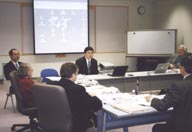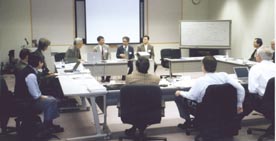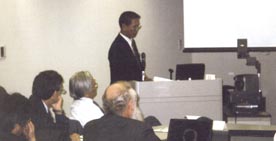|
In February and March
of this year, the Research Review Committee held meetings to evaluate research
done by the Developmental Brain Science Group, the Molecular Neuropathology Group
and the Brainway Group.
At BSI, all research groups are required to undergo a review of their work every
five years. In the review, the results, progress and future direction of the research
conducted by the groupÕs laboratories, along with those of the group as a whole,
are evaluated by Japanese and foreign experts in corresponding research fields.
The result of each review sets the course of future plans for the laboratories
and their group.
The essence of the committeeÕs evaluations for each group is as follows
 |
The
research review commitee meeting for the Developmental Brain Science Group |
The Developmental Brain
Science Group
(Group Director: Katsuhiko Mikoshiba; three laboratories in the group)
The committee met from February 5 through 7. It comprised eight members and was
chaired by Prof. Lynn Landmesser (Case Western Reserve University, U.S.A.)
The Gist of the Evaluation:
By elucidating the molecular and genetic mechanisms by which the brain forms,
the Developmental Brain Science Group addresses a highly significant area of modern
neuroscience. While utilizing a variety of model organisms, each laboratory addresses
themes that both overlap and are complementary and thus provide an overall coherent
focus for the Group. The review committee strongly recommends that BSI continue
to support the Developmental Brain Science Group for the next five years at roughly
its current level of funding.
Overall the Group addresses an important area of neuroscience and its presence
significantly enhances BSI. Laboratory for Developmental Neurobiology is an outstanding
laboratory that has made major contributions to the overall theme of the Group.
Laboratory for Developmental Gene Regulation has made excellent progress and prospects
for future productivity are very good. Support for a further five years is recommended
for these two laboratories. The Laboratory for Molecular Neurogenesis was established
more recently than the other laboratories in the Group and the research in this
laboratory is at a more preliminary stage. Research progress is reasonable and
the success of the approaches should become much more evident within two to three
year time. The review committee proposes that its research progress be re-evaluated
at that time.
The review committee
strongly supports the continuation of the newly created Senior Scientist positions
as this allows some of the most promising young scientists a chance to develop
an independent research identity and overall will greatly enhance the quality
of neuroscience research in Japan in the future.
The committee strongly recommends the establishment of a national zebrafish facility.
Hundreds of mutations will be identified and the lines carrying these mutations
will represent a hugely important resource for the Japanese scientific community,
and for the zebrafish community as a whole.
The review committee strongly recommends that the Laboratories in the Development
Brain Science Group participate more fully in graduate student training. The Committee
feels that graduate students help foster an atmosphere of enthusiasm, energy and
excitement in the laboratory and that they are very effective in promoting cross
fertilization between laboratories. In addition, they provide an opportunity for
junior members to develop teaching and supervisory abilities.
The review committee recommends that a new laboratory head be recruited to lead
the former laboratory of neural regeneration.
 |
The
research review commitee meeting for the Molecular Neuropathology Group |
The Molecular Neuropathology
Group
(Group Director: Nobuyuki Nukina; four laboratories in the group)
The committee met from March 13 through 15. It comprised 10 members and was chaired
by Prof. William C. Mobley (Stanford University)
The Gist of the Evaluation:
The mission of the Molecular Neuropathology Group (MNG) was to understand the
pathomechanism of neurodegenerative disorders and to develop measures to protect
susceptible individuals from neurological diseases. The review committee views
the work of the MNG as highly successful and important and believes strongly that
the work of the MNG and of the Laboratories for CAG Repeat Diseases, Neurogenetics
and Motor System Degeneration should continue. It is hoped that by encouraging
a focus on hypothesis-based focus for research, better integration of activities
among MNG member laboratories, and the creation of strategic collaborations with
Japanese and international investigators, the MNG will assume a leading role in
research on the pathogenesis and treatment of neurodegeneration.
Laboratory for CAG Repeat Diseases has made a number of important contributions
to the work of the MNG. Support for an additional five years is recommended. The
review committee recommends that this laboratory refocus its efforts on the most
important pathobiological questions on mechanisms of polyQ mediated neurodegeneration
and that this laboratory improve interactions with other laboratories working
on related problems within the institute and other research centers addressing
polyQ diseases.
Laboratory for Neurogenetics has made important contributions with respect to
the genetics and mechanisms of epilepsy. Support is recommended for an additional
five years. The review committee wishes to see the lab focus its efforts more
narrowly so that it can achieve international prominence.
Laboratory for Motor System Neurodegeneration is an outstanding laboratory that
has demonstrated its ability to contribute significantly to our understanding
of neurodegenerative disease mechanisms. Support for an additional five years
is recommended.
Due to the loss of the permanent head of Laboratory for Neurodegeneration Signal
through resignation, after a brief transition period to allow the current investigators
to finish up key experiments, the review committee recommends dissolving this
laboratory and creating a new neurodegenerative disease mechanism laboratory that
will enhance and complement the work of the MNG.
The review committee would urge BSI to encourage the goal through emphasizing
the creation of focused, hypothesis-driven research programs. Moreover, BSI should
actively and aggressively support collaboration of MNG laboratories with outstanding
Japanese and international scientists.
 |
The
research review commitee meeting for the Brainway Group |
The Brainway Group
(Group Director: Gen Matsumoto;
two laboratories in the group)
The committee met from March 18 through 20. It comprised six members and was chaired
by Prof. Rodney Douglas (Swiss Federal Institute of Technology Zurich)
The Gist of the Evaluation:
The mission of the Brainway Group is to elucidate the design principles of the
brain, and to apply this knowledge to the design and development of a brain computer.
The Group proposes that the brain has two central design principles: output-driven
operation, and memory-based architecture. In this first 5-year period, the Group
chose a research strategy in which biological experiments would be used to confirm,
and elaborate, these two principles. While a number of these experiments are interesting
contributions to systems neuroscience, the review committee recommends a major
shift of Laboratory for Brain-operative Expression (E-lab) resources to two new
efforts, the general formalization of brain-style computing, and computational
modeling of each experiment to yield brain-style computing principles. Moreover,
all future E-lab experiments must contribute to these efforts as well as to the
design of brain-style subsystems for devices being built in the Laboratory for
Brain-operative Device (D-Lab) or other laboratories of the Creating the Brain
area.
D-lab has 2 major foci. The first is on optical imaging and other technologies
for measuring neural activity. This work is excellent. It is very relevant to
neuroscience research at RIKEN BSI, and to the neuroscience community world-wide.
However, it makes no direct contribution to developing brain-operative devices.
Therefore the review committee recommends that this project have an independent
status, uncoupled from the scientific goals of Brainway and that it be given exceptional
financial and personnel support. The second focus of D-lab is on learning and
robotics. D-Lab has developed two promising robot controllers but these are based
on standard visual preprocessing and adaptive artificial neural networks. The
review committee recommends that E-lab develop an explicit strategy to ensure
that future work on robotics in D-lab contribute to the development of "brain-operative
devices" based on explicit analysis of the role of brains in action, perception,
memory and cognition.
To ensure that a transition is made to these new emphases, the review committee
recommends that funding of the Brainway Group (as distinct from the Imager Project)
be renewed initially for only 2 years, with further funding being subject to the
results of a review in 2004 of progress in creating the new structures.
|






